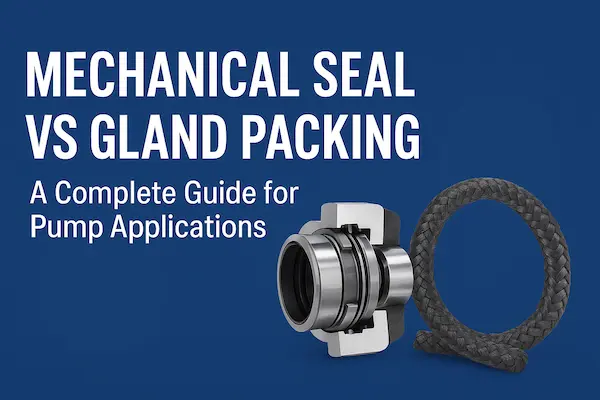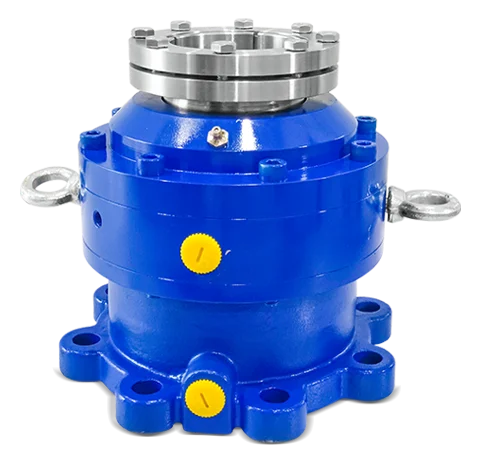Posted At: Aug 27, 2025 - 1,919 Views

Mechanical Seal vs Gland Packing: A Complete Guide for Pump Applications
When it comes to pump sealing solutions, two of the most widely used methods are mechanical seals and gland packing seals. Both play a crucial role in preventing leakage, maintaining pressure, and ensuring smooth pump performance. However, each sealing method has its own advantages, limitations, and ideal applications.
In this guide, we’ll break down mechanical seal vs gland packing, explain what is gland packing, and help you understand which sealing solution is best for your pump system. This comparison also helps you understand how a gland seal in pump systems works and how it differs from a mechanical seal.
What Is Gland Packing?
Gland packing is one of the oldest sealing methods used in pumps. It involves inserting a braided rope-like material (usually made from graphite, PTFE, or synthetic fibers) around the pump shaft inside the stuffing box. The packing material is compressed with a gland follower, creating a tight seal to minimize leakage.
This method is also referred to as a gland packing seal and is still widely used in many industries because of its low cost and easy installation.
Gland packing is commonly used in stuffing box pump designs where controlled leakage is required for lubrication.
Key Features of Gland Packing in Pumps:
Simple and affordable sealing method.
Can handle a wide range of fluids.
Requires frequent adjustments to maintain sealing performance.
Causes friction and heat generation around the pump shaft.
Leakage is expected and sometimes necessary for lubrication and cooling.
How a Gland Seal in Pump Systems Works
A gland seal in pump applications works by compressing packing rings inside the stuffing box to control leakage. This method has been used for decades in traditional stuffing box pump designs.
What Is a Mechanical Seal?
Unlike gland packing, a mechanical seal uses precision-engineered components, including a rotating face and a stationary face, to create a seal between the pump shaft and housing. These faces are pressed together with the help of springs and secondary sealing elements (O-rings or gaskets), preventing fluid leakage.
Key Features of Mechanical Seals:
Provides a near leak-free sealing solution.
Reduces wear and friction on the pump shaft.
Requires less maintenance compared to gland packing.
Suitable for high-pressure, high-speed, and hazardous fluid applications.
Longer service life, making them cost-effective in the long run.
Mechanical Seal vs Gland Packing: Key Differences
When comparing gland packing vs mechanical seal, several critical factors must be considered:
| Aspect | Gland Packing | Mechanical Seal |
|---|---|---|
| Initial Cost | Low | High |
| Maintenance | Frequent adjustments needed | Minimal |
| Leakage | Allows controlled leakage | Nearly leak-free |
| Energy Efficiency | Higher friction → more power loss | Energy-efficient |
| Shaft Wear | High wear due to friction | Low wear |
| Service Life | Shorter lifespan | Longer lifespan |
| Common Application | Modern pumps | Stuffing box pump / gland seal in pump |
Advantages of Gland Packing
While mechanical seals are considered modern and efficient, gland packing seals still hold value in certain industries.
Cost-effective for low-budget applications.
Easy to install and replace without specialized tools.
Performs well in pumps handling non-hazardous liquids.
Suitable where controlled leakage is acceptable.
Advantages of Mechanical Seals
Mechanical seals are preferred in industries where leakage and downtime can lead to significant losses.
Ideal for high-pressure and high-temperature environments.
Reduces operational costs by lowering energy consumption.
Provides a safer and cleaner work environment.
Extends pump life by reducing shaft wear.
Can handle corrosive and hazardous fluids effectively.
Gland Packing in Pumps: Where Is It Used?
Gland packing in pumps is commonly used in:
Water supply pumps.
Agricultural irrigation systems.
Low-cost industrial pumps.
Applications where minor leakage is not a concern.
Mechanical Seals in Pumps: Where Are They Used?
Mechanical seals are widely used in:
Oil and gas industry pumps.
Chemical processing plants.
Pharmaceutical and food-grade pumps.
Power generation and water treatment facilities.
Applications requiring zero leakage and high reliability.
Which Should You Choose: Mechanical Seal vs Gland Packing?
When deciding between mechanical seal vs gland packing, the right choice depends on:
Budget: Gland packing is cheaper upfront, while mechanical seals reduce long-term costs.
Application type: For hazardous or expensive fluids, mechanical seals are the safer option.
Maintenance capability: If frequent adjustments are acceptable, gland packing may work.
Energy efficiency needs: Mechanical seals save energy by reducing frictional losses.
Conclusion
Gland packing seals and mechanical seals play important roles in pump sealing. While gland packing in pumps remains relevant for simple, low-cost applications, mechanical seals offer unmatched reliability, efficiency, and long-term benefits for modern industries.
Both mechanical seals and traditional stuffing box pump sealing methods have unique benefits depending on application needs.
By understanding the differences between mechanical seal vs gland packing, you can choose the best sealing solution for your pump system—balancing cost, performance, and maintenance requirements.
Frequently Asked Questions
1. What is gland packing in pumps?
Gland packing in pumps is a sealing method that uses braided rope-like material compressed around the pump shaft to reduce leakage. It’s simple, cost-effective, and widely used in water pumps and general-purpose applications.
2. What is the difference between mechanical seal and gland packing?
The main difference between mechanical seal vs gland packing is leakage control and efficiency. Gland packing allows controlled leakage and requires frequent adjustments, while mechanical seals offer a nearly leak-free, low-maintenance solution with better energy efficiency.
3. Which is better: gland packing or mechanical seal?
It depends on the application.
Gland packing is cheaper, easier to install, and suitable for non-critical applications.
Mechanical seals are ideal for high-pressure, high-speed, and hazardous fluid pumps where leakage must be avoided.
4. Where is gland packing used?
Gland packing seals are commonly used in:
Water supply and irrigation pumps.
Low-cost industrial pumping systems.
Applications where minor leakage is acceptable.
What is a gland seal in pump systems?
A gland seal in pump systems uses packing material inside the stuffing box to minimize leakage while providing lubrication to the shaft.
What is a stuffing box pump?
A stuffing box pump uses gland packing compressed around the shaft to create a seal. It is common in older pumps or applications where small leakage is acceptable.


